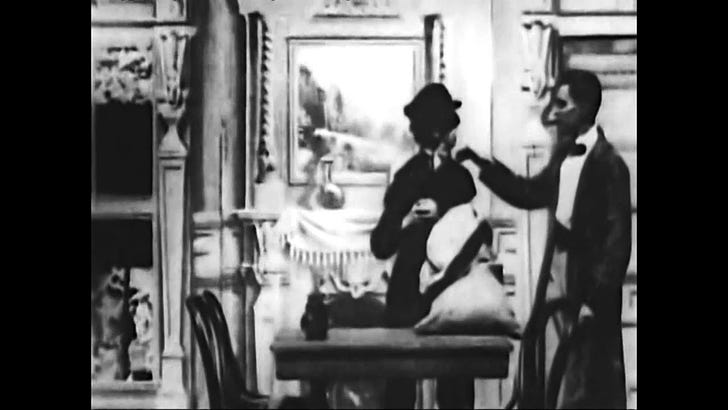Hey rule-breakers,
I headed out on vacation to Florida yesterday, so there won’t be a new episode this week. Sorry about that y’all! I’m done editing the book (I think) and my weeks and weeks of spring travel are behind me now, so we’ll be getting back to our regularly scheduled episodes and programming (finally). I’m really excited to dive back into the lives and times of some of history’s greatest rule-breakers with y’all.
But for now, here’s how history has been acting unruly in the news…
This week marked the 5oth anniversary of Dr. Martin Luther King Jr.’s assassination. National Geographic wonders “What if Martin Luther King Jr were never assassinated?”
Art collector Nazem Said Ahmad has been charged with using art dealing to fund Hezbollah, a militant extremist group in Lebanon. The art world is coming under increasing scrutiny in the last few years because it is basically the Wild West in terms of financial regulation.
In what once was lost might still be found:
Long thought lost, a copy of the earliest known detective film has been found. It features my very favorite detective, Sherlock Holmes, being baffled.
The Xerxes Canal has been found. It was long thought to be a myth, a tall-tale told to embellish the might of Persian ruler King Xerxes I. But recent archaeological finds at the Mount Athos Peninsula offer evidence of a canal so wide the entire navy of Persia could pass through it.
The search for Roanoke, the first English colony in North America, continues. What happened to these settles twenty years before Jamestown has been a mystery that has haunted American history ever since. Though we may never know the full answer of what became of those people, the Croatoan Archaeological Society holds a dig every year to try to find out.
From about 300 BCE to 300 CE, during what’s called the Yayoi period, Japan transitioned from a hunting and gathering society to an agricultural society. A perfectly preserved wooden mask from this time was just found during construction to expand the Osaka Monorail.
We still don’t have answers about what happened to the Yuba County Five. Mysteriously, at least one man survived for a couple of months after the five went missing, and one’s body was never found.
Archaeologists uncovered an “opulent” Roman winery where the wine was made and flowed lavishly. It dates to the reign of Gordian III, who was thought to have little architectural impact. This villa is just the second known example of people watching the making of winery.
A 2000-year-old necropolis was just found under a train station in Paris. The burial site dates to the Greco-Roman city of Lutetia, the pre-cursor to Paris. Archaeologists had long thought that this site existed, but weren’t sure where it was.
Artifacts damaged during the ongoing conflict in Syria were restored in Prague at the National Museum. The museum’s director Michal Lukes believes that the artifacts were damaged intentionally with a hammer, an ongoing trend in extremist attacks on culture. The artifacts are set to be returned as soon as possible.
What do you know about the origins of Passover? It began as a celebration of Israelite’s freedom from slavery, but the event itself kept evolving under the influence of ancient Egypt and ancient Babylon.
A mummified ice age squirrel was found in Canada. Not only is it giving me Ice Age vibes, but this perfectly preserved little guy is intriguing to scientists because he shows that squirrels haven’t changed that much despite 30,000 years of changing climates. It begs the question, what are squirrels getting right?
Speaking of learning from our furry friends, stray dogs have survived around Chernobyl for several doggy generations now. The city was the site of a nuclear plant meltdown in 1986, and the land has been declared an Exclusion Zone ever since. It’s far too radioactive for humans to live there. But the ongoing survival of the dogs at Chernobyl makes scientists wonder if there is a way to live with radiation. The dogs are being treated humanely and tracked to see genetic mutations over time.
Looking to make some quick money? Well, this probably won’t be quick, but it might be the most interesting way to make $25,000: The Maine Mineral and Gem Museum is offering $25,000 to anyone who can bring them a piece of the meteorite that burned through the US earlier this month.
In Scotland, the remains of a Roman fort have been found at Clydebank.

An artist’s rendition of what the fort have might have looked like. Source. We know all about how Titanic was sank. But who dreamed it up? How?
The concept of backspace—backing up and erasing, making something simply disappear—is a unique one tied intrinsically to the keyboard. This history of the keyboard in the MIT Tech Review goes over how we got each key and the shape of keyboards today.
200 years of New York’s seedy underbelly. From its first known* street gang in 1800 to a 2019 mob boss assassination, this is a history of organized crime. (*I’m so sorry but I just refuse to believe that there were no street gangs in New York pre-1800.)
What do you know about Frank Wills, the 24-year-old security guard who foiled the Watergate break-in and revealed an American scandal?
These 33 photos reveal the devastation of the Lebanese Civil War. Beirut was once thought of as “the Paris of Middle East” but this 1975 conflict changed that.

Beirut, Lebanon before the civil war. Photo credit: Culture Club/Bridgeman via Getty Images. Have you heard of the Ostend Manifesto, the 1854 US attempt to seize Cuba from the Spanish empire?




